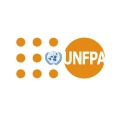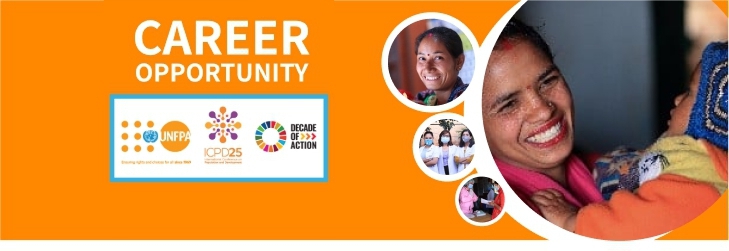


UNFPA, the United Nations Population Fund, is a voluntary-funded international organization with a presence in over 150 countries, including Nepal. UNFPA is guided by the Programme of Action of the 1994 Cairo International Conference on Population and Development (ICPD) and the Sustainable Development Goals. Its mission is to ensure that every pregnancy is wanted, every childbirth is safe and every young person’s potential is fulfilled.
The work of UNFPA is based on the premise that all human beings are entitled to equal rights and protections. We focus on women and young people because these are groups whose ability to exercise their right to sexual and reproductive health is often compromised. Our work is informed by an understanding of population dynamics, human rights and cultural sensitivity.
UNFPA in Nepal
UNFPA support to Nepal began in 1971 and has evolved in response to the changing national contexts. The new country programme is aligned to national priorities, the 2030 Agenda for Sustainable Development, the ICPD Programme of Action, the Convention on the Elimination of All Forms of Discrimination against Women, the UNFPA strategic plan, 2022–2025, and the UNSDCF, 2023–2027. The programme aims to contribute to and accelerate achievement of the 2030 Agenda, in particular SDGs 3 and 5 and the three UNFPA transformative results, in line with the Decade of Action.
UNFPA partners with the Government of Nepal, youth and women’s organizations and development partners to advance its mission. Under the 9th Country Programme and in line with its mandate, UNFPA Nepal is working around the following areas:
Sexual and reproductive health and rights: UNFPA is supporting national efforts in Nepal to improve the sexual and reproductive health of the most marginalized adolescent girls and women. The Fund is largely focusing on youth aged 15-24 and the most marginalized women addressing both the demand and supply sides of reproductive health services to improve access to information and services on maternal health, family planning, and sexually transmitted infections, including HIV.
Gender equality, Gender-based violence and Harmful Practices : UNFPA’s support to the Government of Nepal under this overarching theme seeks to ensure that vulnerable groups experience greater self-confidence, respect and dignity. We are building national capacity in the health sector to address gender-based violence (GBV), prevent child marriage and other harmful practices, and working to enhance the knowledge and capacity of men, women and communities to GBV. Investing in young people, especially the vulnerable and the marginalized, is a priority for UNFPA Nepal. The country has a large adolescent and youth population. Nepal is experiencing a demographic window of opportunity, a ‘youth bulge’. Nepali youth face several development challenges, including access to education, employment, gender inequality, child marriage, youth-friendly health services and adolescent pregnancy. Yet, with investments in their participation and leadership, young people can transform the social and economic fortunes of the country. UNFPA Nepal works with the government and partners to advocate for adolescents and youth’s rights and investments, including education, livelihood skills and health, including sexual and reproductive health.
Disaster risk reduction and climate change: UNFPA is working on environmental sustainability, climate and disaster resilience, with a focus on ensuring that the specific needs and rights of women and girls, particularly those from vulnerable and marginalized groups, are addressed in humanitarian preparedness, adaptation, response, and recovery efforts.
Population dynamics: Population megatrends at the national and sub-national levels in Nepal continued rapid population growth, population aging, urbanization and migration — not only frame the entire development debate, they demand a reconsideration and re-conceptualization of what will be the main challenges for a new Nepal. Without an adequate understanding of how Nepal is changing from a demographic perspective, forward-looking planning and agenda setting will be of little value. Keeping this in mind, UNFPA Nepal is working with the government to ensure that national, sectoral and decentralized policies and plans address population dynamics and the interlinkages with gender equality, poverty reduction, the needs of young people, and reproductive health, including family planning.
UNFPA, the United Nations Population Fund, is a voluntary-funded international organization with a presence in over 150 countries, including Nepal. UNFPA is guided by the Programme of Action of the 1994 Cairo International Conference on Population and Development (ICPD) and the Sustainable Development Goals. Its mission is to ensure that every pregnancy is wanted, every childbirth is safe and every young person’s potential …
Views: 4763 | This job is expired 6 months ago
Job Opening ID: 22971
Location: Janakpur, Nepal
Full/Part time: Full Time
Vacancy Type: Fixed Term
Grade: NO-B
Rotational/Non Rotational: Non-rotational
Duration: 1 year initially with possibility of extension
Education & Work Experience: Master's Degree with at least 2 year(s) experience
Deadline: 10 January 2025 by 5:30 PM NPT
The Position:
The Programme Analyst - Gender leads UNFPA’s work in the assigned Province on gender equality and human rights, with a special focus on gender-based violence (GBV) and harmful practices, towards accelerating the achievement of the International Conference on Population and Development (ICPD) Programme of Action (PoA), the Beijing Platform for Action, the 2030 Agenda and other global, regional and national frameworks.
S/he provides technical leadership, policy advice and management support to the UNFPA programmes in the assigned province on gender equality, women’s rights, gender-based violence, and harmful practices. S/he promotes inter-linkages within the gender portfolio of projects and among other programmes in the areas of reproductive health, adolescents and youth and population dynamics, and builds capacities of staff and concerned partners at the provincial level to mainstream gender and incorporate an intersectionality lens across all programme areas in the province.
How you can make a difference:
UNFPA is the lead UN agency for delivering a world where every pregnancy is wanted, every childbirth is safe and every young person's potential is fulfilled. UNFPA’s strategic plan focuses on three transformative results: to end preventable maternal deaths; end unmet need for family planning; and end gender-based violence and harmful practices.
In a world where fundamental human rights are at risk, we need principled and ethical staff, who embody these international norms and standards, and who will defend them courageously and with full conviction.
UNFPA is seeking candidates that transform, inspire and deliver high impact and sustained results; we need staff who uphold the values enshrined in the United Nations Charter, who are transparent, exceptional in how they manage the resources entrusted to them and who commit to deliver excellence in programme results.
Job Purpose:
The UNFPA Strategic Plan embraces the vision of the 2030 Agenda and places the achievement of gender equality and the empowerment of women and girls as a priority, and as an essential precondition to reaching those furthest behind. This together with UNFPA’s commitments to support the realization of international conventions and resolutions, including the Convention on the Elimination of all Forms of Discrimination against Women (CEDAW), ICPD Beyond 2014 Review, the Beijing Declaration and Platform for Action plus 20 Review, the 2030 Agenda for Sustainable Development, UN Security Council Resolution 1325 among others, confirm that gender equality and the empowerment of women and girls is at the heart of UNFPA’s work, both as a stand-alone dedicated area of work and from a mainstreaming approach.
In Nepal, women have long experienced high levels of poverty, violence, social exclusion and marginalization because of their gender. One in four ever married women have experienced spousal physical, sexual, or emotional violence. Social norms that value men and boys over women and girls deny equal opportunities to women and girls and result in a range of harmful practices, including child marriage and gender-biased sex selection. Evidence shows that vulnerabilities of women and adolescents are exacerbated during crisis situations, heightening their risk to gender-based violence. For women from ethnic minorities and groups considered low caste and those living with disabilities, these disadvantages are greatly compounded, making them the most left behind.
To advance gender equality and the empowerment of women and girls, UNFPA contributes to strengthening policy, legal and accountability frameworks. This includes support for policies and programmes and human rights mechanisms that protect the rights of women and girls, promote equal opportunities, and end all forms of violence and discrimination against women and girls and other marginalized groups.
UNFPA implements comprehensive programmes to change underlying social norms that impede eliminating gender discriminatory practices, including gender-based violence and harmful practices. In Nepal, UNFPA manages a portfolio of Gender-Based Violence (GBV) and Harmful Practices programmes, including the GBV Prevention and Response (GBVPR) programme, Empowered Women Prosperous Nepal (EWPN), Safe Girls Project and other projects that focus on ending child marriage, and comprehensive sexuality education.
As the lead agency for gender-based violence area of responsibility under the Global Protection Cluster, UNFPA plays a prominent inter-agency role and supports multi-sectoral capacity building and the use of a continuum approach in development and humanitarian settings to address GBV. All these programmes are closely linked to UNFPA-supported interventions to advance reproductive rights in the country, supported by efforts to improve population data systems to map and address inequalities and improve the availability of sex disaggregated data across the country.
The Programme Analyst - Gender is entrusted with the responsibility of engaging in advocacy and policy dialogue for concerted actions by the provincial and local government counterparts, UN system and other development partners, and civil society organizations and networks on issues related to gender equality and the empowerment of women and girls, with a special focus on GBV and harmful practices. S/he will provide technical assistance and build partnerships to leverage financial and technical resources for the accelerated achievement of UNFPA’s transformative programme goals. S/he will support the development, implementation, and oversight of UNFPA’s work on gender and women’s rights including social inclusion dimensions at provincial and local level and will coordinate with relevant UNFPA staff across thematic and other teams at all operational levels. S/he will establish, nurture and participate in sub-national networks in this field and promote harmonisation of gender and GBV interventions in the province and local level among the relevant actors.
Under the overall technical guidance of the Gender Equality & Human Rights Specialist, and the direct supervision of the Head of the Provincial Office, Janakpur, the Programme Analyst - Gender will be responsible for;
You will be responsible for:
A. Policy Dialogue and Technical Leadership:
B. Programme Management and Coordination:
C. Advocacy and Resource Mobilization:
D. Knowledge Management:
Qualifications and Experience:
Education:
Advanced degree in Gender Studies, Human Rights, Law, Public Policy, Development Studies, or related disciplines.
Knowledge and Experience:
Languages:
Proficiency in English and Nepali is required. Working knowledge of another UN language is an asset.
Required Competencies:
Values:
Functional Competencies:
Core Competencies:
Managerial Competencies:
Compensation and Benefits:
This position offers an attractive remuneration package including a competitive net salary plus, health insurance, pension and other benefits as applicable.
*No expectancy of renewal in accordance with UN Staff Regulations 4.5
Disclaimer:
UNFPA does not charge any application, processing, training, interviewing, testing or other fee in connection with the application or recruitment process. Fraudulent notices, letters or offers may be submitted to the UNFPA fraud hotline http://www.unfpa.org/help/hotline.cfm
In accordance with the Staff Regulations and Rules of the United Nations, persons applying to posts in the international Professional category, who hold permanent resident status in a country other than their country of nationality, may be required to renounce such status upon their appointment.
This job has expired.









